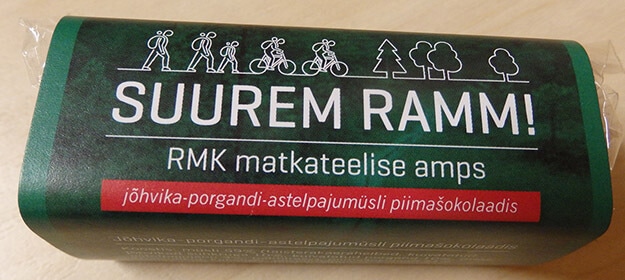 You know muesli. Originally known in Swiss German as Bircher/muesli, (because it was developed around 1900 by Swiss physician Maximilian Bircher-Benner for patients in his hospital), or simply Müesli, the word is an Alemannic German diminutive of Mues which means “puree” or “mash-up.”
You know muesli. Originally known in Swiss German as Bircher/muesli, (because it was developed around 1900 by Swiss physician Maximilian Bircher-Benner for patients in his hospital), or simply Müesli, the word is an Alemannic German diminutive of Mues which means “puree” or “mash-up.”
In non-Swiss Standard German, it is spelled MÜSLI, just like in Estonian. Müsli is defined as a breakfast and brunch dish based on toored kaera/helbed (raw rolled oats) and other ingredients including tera/viljad (grains), fresh or dried fruits, seemned (seeds) and pähklid (nuts), and may be mixed with any kind of piim (milk), jogurt or fruit juice.
And when it’s pressed into a bar for snacking, Estonians call it a müsli/batoon or müsli baton. Like the one you pass on in a relay running race or twirl in a parade, only a lot more practical and maitsev (tasty).
Shown here is a rather exclusive and unique variety, which was handed out to hundud (cub scouts) at a weekend camp recently after hiking a RMK (Riigi/metsa Majadamise Keskuse) or State Forest Management Centre trail.
Suurem RAMM means “greater (physical) strength”. A rammu/mees is traditionally a man exhibiting great ramm, such as a weightlifter (tõstja) or wrestler (maadleja). A synonym for ramm – strong like a ram, but is in fact pronounced like “rum” – is JAKS, which means might or endurance. If you have the strength and/or ability to do something, then you can achieve it: sa jaksad.
Ramm is what this RMK sponsored matka/teelise amps or hiker’s snack promises to help you with. The loan word snäkk has made its way into Estonian long ago, but AMPS is a good original Estonian word meaning mouthful. And it’s onomatopoetic to boot; the equivalent of “chomp”.
What specifically does this NÄMMI AMPS or “yummy bite” contain? It is a: jõhvika– cranberry, porgandi – carrot, astel/paju – seabuckthorn müsli-mixture piima/šokolaadis in milk chocolate. Fancy that.
All nature lovers are encouraged to visit the RMK website. There’s a bit more to peruse on the Estonian language page, but the English version currently opens with quick access to a mets/kitse deer camera (www.rmk.ee/en).
Text and photo:
Riina Kindlam,
Tallinn















